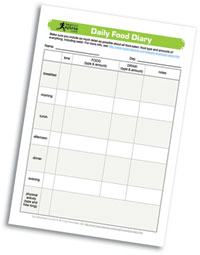What You Need
First you should download one of our food diaries which has been designed to record all food and drink intake on a daily basis. You also need to be able to accurately record portion sizes of the food you are eating. These items would be useful: a kitchen scale, measuring cups and spoons.
What to Do
- Print out the daily diary sheet, a copy for each day you will record your diet. For diaries over three or more days, make sure you include one weekend day.
- Enter as much information as you can: the extra personal information about your lifestyle, medical conditions and weight goals are required to best interpret the data.
- Eat as you normally would, and make note of everything that you are eating. Make sure you include as much detail as possible. Be as specific as you can about the food type and amounts. If possible, also list the ingredients of what you are eating (e.g.if you eat a burger, also list ketchup, lettuce, tomato etc). Include all water and hot drinks in the drink category. Include any supplements such as vitamins, sports or herbal supplements you are taking.

- The key to keeping a complete, accurate food diary is to make your entries as soon as you have eaten. Aim to carry your food diary with at all times, and avoid recording the whole day's intake at night.
- Print out additional pages if necessary.
- Once complete, show it to a dietitian who can analyze and interpret the results.
Related Pages
- Download one of our free Food Diaries.
- See about having your food diary analyzed.
- List and Discussion of Dietary Assessment Methods
- Benefits of keeping a food diary
- More nutrition downloads


 Upcoming Events
Upcoming Events